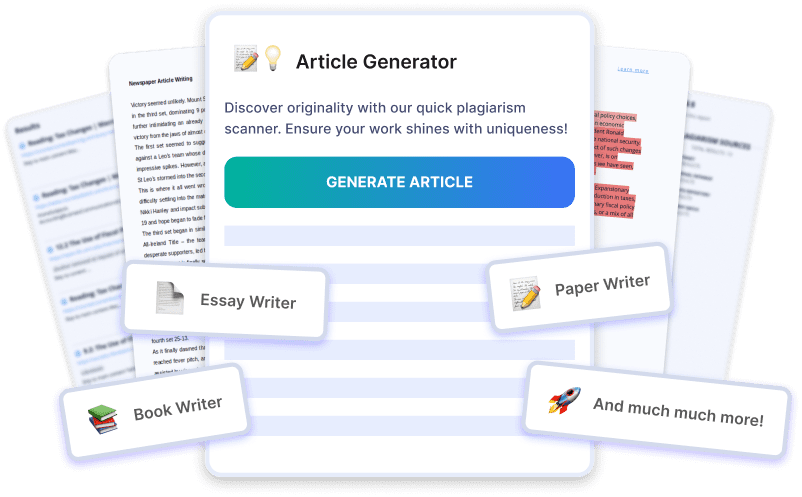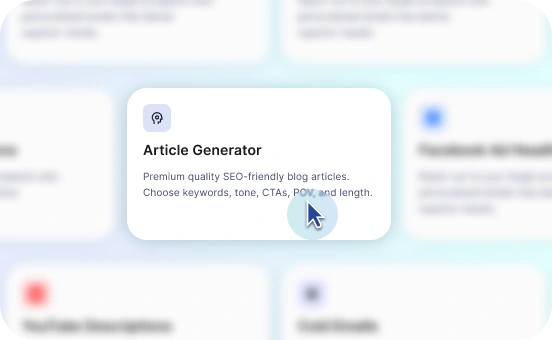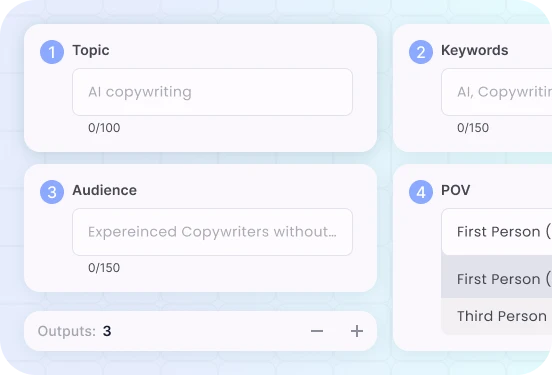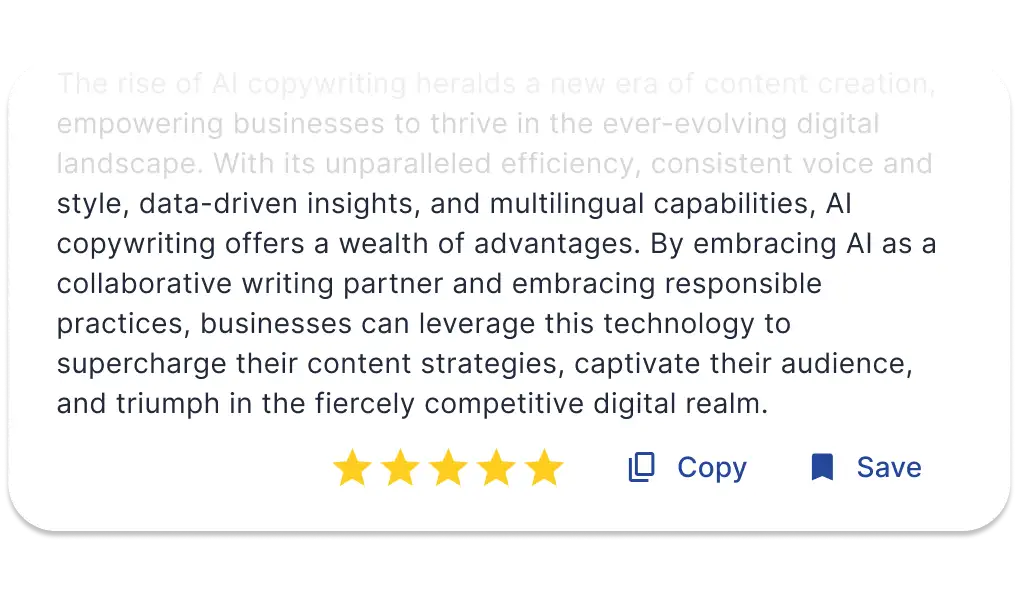AI-Powered Literature Review Writing
Learn how to write literature reviews for research papers using AI with Justdone.ai's innovative tools.
Try Justdone
AI Benefits for You
Enhanced Efficiency
Write literature reviews faster and with increased accuracy using AI-powered tools.
Advanced Integration
Seamlessly integrate AI technology into your research paper writing process for enhanced efficiency.
Superior Accuracy
Experience enhanced accuracy and precision in writing literature reviews with AI-driven solutions.
AI Writing Tools for Literature Review Research
Efficiency and Accuracy
AI writing tools for literature review research offer unparalleled efficiency and accuracy. These advanced tools utilize artificial intelligence to generate well-structured literature reviews with precise data analysis. By leveraging the capabilities of AI, researchers can significantly reduce the time and effort required to produce high-quality literature reviews.
The best AI writing tools for literature review research ensure that the content is meticulously crafted, incorporating the most relevant information and eliminating the risk of errors commonly associated with manual writing. With these AI tools for writing, researchers can streamline their workflow and enhance the overall quality of their literature reviews.
Try Justdone ->
Enhanced Research Insights
Using AI tools for writing in literature review research allows researchers to gain enhanced insights into their chosen topic. These tools provide comprehensive analysis and identification of key themes, helping researchers to uncover valuable patterns and trends within the literature. By harnessing the power of AI, researchers can delve deeper into their subject matter and extract meaningful findings.
Online writing tools equipped with AI capabilities empower researchers to produce literature reviews that are enriched with valuable insights, contributing to the generation of impactful research outcomes. The integration of AI tools for writing ensures that literature reviews are not only comprehensive but also insightful and influential.
Try Justdone ->
Streamlined Collaboration
AI writing tools facilitate streamlined collaboration among researchers involved in literature review research. These tools enable seamless integration of multiple perspectives and contributions, fostering a cohesive and unified literature review. With the best AI writing tools, researchers can collaborate in real time, share feedback, and collectively refine the literature review to achieve a cohesive final output.
The integration of AI tools for writing in collaborative research endeavors promotes efficiency and synergy, allowing researchers to collectively harness their expertise and insights. By leveraging these tools, researchers can ensure that their collaborative literature reviews are comprehensive, coherent, and impactful.
Try Justdone ->
Maximizing the Benefits of AI Writing Tools
Utilize Advanced Features
When using the best AI tools for writing literature reviews, it's crucial to explore and utilize advanced features offered by these tools. Features such as data analysis, citation management, and content structuring can significantly enhance the quality and depth of the literature review.
By leveraging the advanced capabilities of AI writing tools, researchers can streamline the review process and produce literature reviews that are enriched with comprehensive insights and meticulously organized content.
Incorporate Diverse Sources
To maximize the effectiveness of AI writing tools for literature review research, it's essential to incorporate diverse sources of information. These tools are adept at processing and analyzing a wide range of sources, including scholarly articles, academic publications, and research papers.
By incorporating diverse sources, researchers can leverage the comprehensive capabilities of AI tools for writing to produce literature reviews that encompass a broad spectrum of perspectives, enhancing the overall depth and richness of the review.
Refine Output with Human Expertise
While AI writing tools offer remarkable capabilities, it's important to complement their outputs with human expertise. Researchers should critically review and refine the literature review generated by AI tools, ensuring that the content aligns with the research objectives and reflects the nuances of the subject matter.
By infusing human expertise into the review process, researchers can elevate the quality of the literature review, integrating valuable insights and scholarly perspectives to produce a comprehensive and impactful output.
Foster Continuous Learning
AI writing tools provide an opportunity for continuous learning and skill development in literature review research. Researchers can explore the functionalities and features of these tools to expand their proficiency in data analysis, content structuring, and research synthesis.
By actively engaging with AI writing tools, researchers can enhance their capabilities in literature review research, fostering continuous learning and skill development to produce literature reviews that exemplify excellence and depth of analysis.
Ensure Ethical Use of AI Tools
Incorporating AI tools for writing in literature review research necessitates a commitment to ethical usage. Researchers should adhere to ethical guidelines and academic integrity when utilizing AI writing tools, ensuring that the generated literature reviews uphold the principles of scholarly conduct and integrity.
By upholding ethical standards in the use of AI tools, researchers can maintain the credibility and authenticity of their literature reviews, contributing to the advancement of ethical research practices in the academic domain.
How to use Article Generator
- 1
Choose a template
Select the necessary template from the template gallery.

- 2
Provide more details
Fill out the carefully selected inputs to create the best quality of output content.

- 3
Enjoy the results
Copy, save for later, rate the output or hit regenerate button.

AI Writing Tools: Inspiration for Literature Review Research
Discover the transformative impact of AI writing tools in enhancing literature review research. Explore the following examples to gain insights into leveraging AI tools for writing literature reviews effectively.
Craft a literature review that provides comprehensive data analysis and identifies key patterns in research findings.
As a researcher delving into literature review research, the task at hand is to craft a comprehensive review that encompasses intricate data analysis and identifies pivotal patterns within the research findings. Leveraging advanced AI writing tools, I will initiate the process by integrating diverse sources of information, including scholarly articles and research publications, to establish a robust foundation for the review.
Utilizing the data analysis features of the AI writing tools, I will meticulously analyze the extracted information, identifying key themes, trends, and correlations within the literature. This in-depth data analysis will enable me to uncover valuable insights and patterns, contributing to the generation of a literature review that exemplifies comprehensive research synthesis and analysis.
By harnessing the capabilities of AI tools for writing, I will ensure that the literature review reflects a meticulous data-driven approach, providing a nuanced analysis of research findings and contributing to the advancement of scholarly discourse in the chosen domain. Through the transformative impact of AI writing tools, the crafted literature review will resonate with insightful data analysis, enriching the research landscape with valuable perspectives and findings.
Create a well-structured literature review that presents a coherent synthesis of diverse research perspectives.
In the realm of literature review research, the imperative is to create a well-structured review that presents a coherent synthesis of diverse research perspectives, fostering a comprehensive understanding of the subject matter. Leveraging the capabilities of AI writing tools, I will embark on the process by curating an array of scholarly sources and academic literature to form the foundational framework for the literature review.
With the aid of AI tools for writing, I will engage in content structuring that encompasses meticulous organization and integration of diverse research perspectives, ensuring a cohesive and insightful literature review. The advanced features of these tools will facilitate the seamless structuring of content, enabling the synthesis of varied perspectives into a unified narrative that reflects the depth and breadth of the research domain.
By harnessing the potential of AI writing tools for content structuring, I will produce a literature review that not only encapsulates diverse research perspectives but also presents a coherent narrative, contributing to the advancement of comprehensive literature review practices. The utilization of AI tools will elevate the structured content, resulting in a literature review that resonates with depth and cohesiveness.